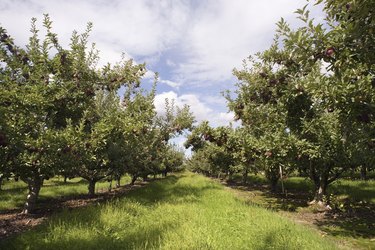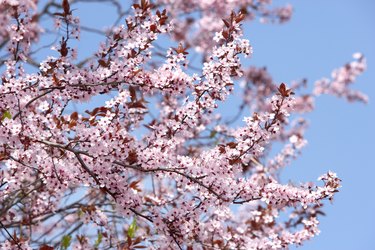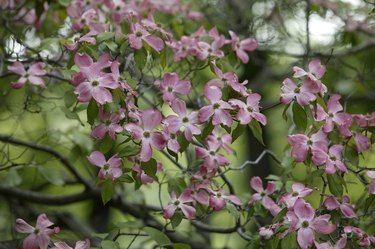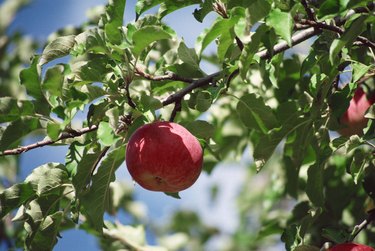
When you think of New England trees, perhaps you think of brilliantly colored foliage in the fall months. While New England's trees don't fail to inspire awe as they turn each year, the region also has some impressive trees valued for their flowering -- and fruiting -- capabilities.
Japanese Flowering Cherry
Video of the Day

The Prunus serrulata, also known as the Japanese Flowering Cherry or Oriental Cherry, is a medium tree growing 15 to 25 feet tall and just as wide. Its growth habit may be upright, horizontal or weeping, depending on the variety. It grows quickly, about 10 feet during a 10-year period, but it lives only 15 to 20 years. The tree flowers between early to midspring, depending on the cultivar. Flowers are white or pink, single or double, and some give a pleasing fragrance. The leaves start out brown and turn a deep green in summer month, becoming bronze and yellow-orange in the fall. These trees rarely produce cherry fruit.
Video of the Day
You'll find the Japanese Flowering Cherry along New England streets, on lawns and in groups, especially for shade. The trees require full sun and thrive in moist, fast-draining, aerated soil. Pruning crossing or rubbing branches immediately after flowering encourages the following season's prolific flowering habit. Kwanzan is the most typical variety, grown with the Yoshino cherry tree in Washington, D.C., for its Cherry Blossom Festival.
Pink Dogwood

Pink Dogwood, botanically named Cornus florida, grows in New England areas with milder weather. It also grows as far south ase Florida and northern Mexico. Its pink blossoms occur in early spring, before its leaves, making it a highly desirable tree. The foliage is a midtone green in the summer months, but it turns brilliant shades of red and maroon in the fall. Its berries also turn bright red and stay on the tree well into fall until they're stripped by birds.
Pink dogwood is naturally rare because the color comes from a recessive gene, though some light pink dogwood clones show their color during cooler spring weather. The tree grows best from a container sapling, placed in well-drained soil with added organic matter. The tree is fairly drought tolerant.
Apple Tree

More than 200 varieties of apple are grown in the New England area. Typical varieties grown in the region include McIntosh and Cortland. Trees thrive when planted deeply for anchorage, a foot deeper and wider than the root ball. Most varieties thrive in areas with full sun and well-drained soil, spaced 30 to 35 feet apart from neighboring trees. Apple trees need to be planted next to another variety that blooms during the same time to pollinate.
Flowers blossom from early spring to midsummer, depending on the variety. Blossoms come in pink or white, depending on the variety. They grow in abundant clusters along or atop tree branches and may have long, prominent stamens in white, red or yellow.